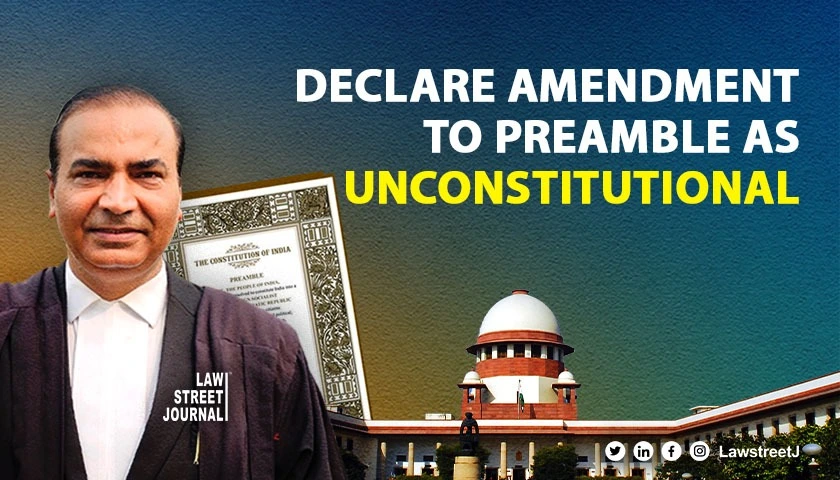Eminent legal and judicial activist Ashwini Kumar Upadhyay has filed a writ petition in the Supreme Court, seeking a declaration that the procedure of inserting the words "Socialist", "Secular" and "Integrity" in the Preamble through the 42nd Amendment of the Constitution in 1976, was manifestly arbitrary, against the due process of law and violative of Article 14 of the Constitution.
Upadhyay, who in the past took up several legal fights for reforms, contended the Preamble is a statement of adoption of the Constitution by the Constituent Assembly on November 26, 1949 and therefore, can’t be changed in the original adoption statement, as it is an unalterable statement.
"However, during the black days of the emergency, the government by the Constitution (42nd Amendment) Act inserted "Socialist, Secular and Integrity" in Preamble without changing the adoption date and on behalf of the Constituent Assembly, which did not exist in 1976 and even without following due process of law," his plea said.
The apex court recently decided to hear the plea along with similar petitions filed by advocate Vishnu Shankar Jain and former Rajya Sabha MP Subramanian Swamy.
In his plea, Upadhyay stated that the Preamble can be amended as per observation of the Supreme Court in “His Holiness Kesavananda Bharati Sripadagalvaru and Ors. v. State of Kerala and Anr" (1973) but, looking at the very nature of the arrangement syntax of the Preamble; amendment has to be done by following due process of law and appending something which reflects the Will of the People” as represented by the Parliament and State Legislatures on a later date.
Section 2 of the Constitution (42nd Amendment) Act, 1976 whereby the expressions Socialist-Secular were purportedly inserted in the Preamble, purportedly by "We, the People of India" and purportedly by the Constituent Assembly, is the biggest fraud on the Constitution, it added.
At that time, the tenure of Lok Sabha was extended to meet the emergency requirements and not to amend the basic structure of the Constitution, it further argued.
His plea further contended when there was widespread fear and threat amongst the citizens, the Press was gagged, the Opposition members of both houses of the Parliament were jailed and democracy was totally throttled, in such circumstances, the Parliament had no authority to amend the Constitution, much less the Preamble and/or Fundamental Rights.
The plea asserted that such a substantial, factual and brazen mistake and manifest arbitrariness cannot be allowed to continuously exist in the Constitution of the largest and the oldest democracy of the world. "In fact, such a post facto alteration of the facts needs to be restored with immediate effect," it said.
Upadhyay contended the cause of action in the matter accrued on September 20. 2023, when the Constitution with original Preamble were distributed amongst the MPs in a gift bag on the opening day of the new parliament building but a few MPs publicly opposed the original Preamble.
The petitioner submitted that the Constitution makers deliberately chose to keep these concepts out of the Preamble.
On November 15, 1948, Professor KT Shah had proposed adding the words Secular, Federal and Socialist Nation, but the Constituent Assembly had rejected it after a lengthy discussion.
Again, on November 25, 1948, a second amendment was introduced and discussed on incorporating the word secular in the draft Constitution. That was also rejected.
On December 3, 1948, a third attempt was made to include secular in the Article 18 of the Constitution, which was also rejected by the Constituent Assembly. Therefore, the Supreme Court may examine how could Parliament go against the solemn declaration by the Constituent Assembly, he contended.
"Socialism and Secularism have been appreciated by some but criticised by many who have repeatedly pointed out to the foreign origins of the words," he said.
Upadhyay said in a truly secular country, all citizens irrespective of religion would be covered by a single set of laws. However, in India people of different religion beliefs are covered by different laws.
He also detailed examples like state control of temples but not of mosques and churches, different laws for majority and minority schools, subsidies for Haj but not for Amarnath Yatra to contend, "India of today is not a secular country. The policies of the Indian state are nor just un-secular but smack of blatant religious reverse-discrimination against its majority community".















